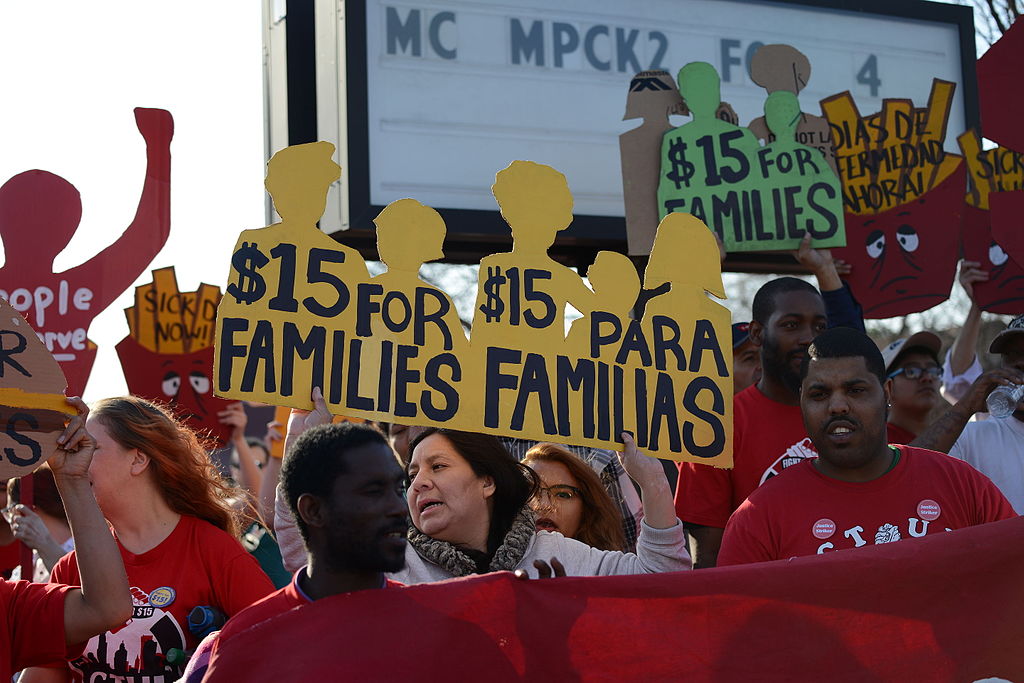A new study published by the Journal of Epidemiology and Community Health found a relationship between suicide rates and increased minimum wage. According to the researchers from Emory University, when the minimum wage is increased by even $1, suicide rates decrease.
“Life expectancy of the richest 20% of Americans has increased over the last three decades, while the life expectancy of the middle 60% has changed little, and has decreased for the poorest 20%. Minimum wage increases may be one intervention to reduce income-based disparities in life expectancy, including from suicide,” the study authors write.

Suicide is one of the leading causes of death in the United States (especially among teens and young adults) and has contributed to the decline of life expectancy. Population-level research reveals that suicide rates in the US have increased by over 30% over the past two decades.
Studies also find that people with lower incomes are more likely to experience depression and attempt suicide than those with higher wages. Moreover, education plays a significant role in suicide rates, as often higher education comes with job opportunities that provide benefits and higher wages.
Studies find that income inequality negatively impacts other aspects of mental health and wellbeing, as poverty and deprivation leads to higher levels of stress, reduced access to health care, and that “social problems result in violence, low levels of trust, and weaker community life.” According to neurological research, these stressors take a toll on these groups’ performance on cognitive tasks.
Losing a job and periods of unemployment, being overcome with debt, and living in financial hardship have all been identified as stressors associated with suicidal ideation and suicide attempts. While a few previous studies suggested that social welfare policies and higher wages may decrease suicide rates, relatively little is known about how economic interventions might reduce suicidality and depression.
As previous research had already determined the association between minimum wage and suicidality, the researchers of this study zoomed in on the relationship between these two factors in people with a high school education or lower within all 50 states from 1999 to 2015. They also aimed to study how unemployment modified the relationship between minimum wage and suicide rates during this period. For both analyses, they adjusted for the effects of inflation.
For adults between 18-64 years of age with high school education, the researchers found that for every $1 increase on minimum wage, suicide was reduced by 3.5% to 6%. Yet there was no reduction for those with an undergraduate, graduate, or professional education, possibly because they would not directly benefit from an increase in the minimum wage.
The researchers also found that unemployment changed the relationship between suicide rates and minimum wage.
“When unemployment is high (>6.5%), progressively higher minimum wages are associated with lower suicide rates, while at low unemployment (3.8%–6.5%), the effect of the minimum wage is attenuated, with little effect observed at very low unemployment (<3.8%).”
When state minimum wage was not higher than the federal minimum wage, suicide rates were the highest. According to their findings, with an increase of $1 or $2 on minimum wage, tens of thousands of suicides may be prevented.
These results add to the growing literature on socioeconomic status, psychology, and health. The findings highlight the importance of increasing the minimum wage, which has been $7.25 since 2009, as it may prevent future suicide attempts. Other studies have also shown how the depressive symptoms and days with mental health problems of people with a high school education or less are reduced when the minimum wage is increased – decreasing further as minimum wage increases.
The growing body of evidence connecting social and economic inequality to increasing suicide rates internationally suggests that policy level public health approaches are needed. This strengthens the case made by the United Nations Special Rapporteur Dainius Pūras, who has called for suicide prevention efforts that “address the structural factors that make lives unliveable and examine how distress arises within power imbalances.”
****
Kaufman, J. A., Salas-Hernández, L. K., Komro, K. A., & Livingston, M. D. (2020). Effects of increased minimum wages by unemployment rate on suicide in the USA. Journal of Epidemiology and Community Health, Jech–2019–212981. DOI:10.1136/jech-2019-212981 (Link)















“Yet there was no reduction for those with an undergraduate, graduate, or professional education, possibly because they would not directly benefit from an increase in the minimum wage.”
Very astute observation, I would go further and hazard a guess that it may well negatively impact them, considering the pool boy, gardener and housekeeper would, on aggregate, cost significantly more.
Report comment
The workplace is broken. That’s clear. More purposeful jobs are needed. More money does not necessarily imply contentment nor eliminate stress. People who consider themselves poor are not necessarily unhappy or unbalanced in any fashion.
Define suicide! Ask why! Why do people suicide? What thoughts push them in that direction?
It’s all about unwritten social reasons.
Report comment
There was a time when a graduate education guaranteed a person a good income. Does this still apply today?
Report comment
So being unable to provide sufficient resources to survive, being worried about losing electrical power or heat or even housing, being unable to eat sufficient food and having no recourse, all of these things could make a person more “depressed?” Golly, jeepers! These poor people must have chemical imbalances, mustn’t they? Or they need to sit and have someone understand the difficult feelings associated with having your family lose their home or slowly starve to death?
I’m glad this research has been done and is published, but how many times to we have to study the obvious? Anyone with half a brain could figure out that poverty feels like crap and will lead to more suicides. Time to DO something about it instead of continuing to blame the victims of our heartless economic system!
Report comment
But the psychiatrists and psychologists are the gate keepers and thieves of the globalist banksters, religions, and they are their “mental health” defamers, and neurotoxic poisoners for the globalist satanists.
Report comment
It is obvious that having a better QOL, where you don’t have to stress would lead to not delving into the abyss.
Living poor among the rich is a much bigger downer than being poor among the poor, especially if being poor has simply always been that way for generations.
I believe it is about more than simply money. Even if incomes are supplemented by governments, there are huge power imbalances and these are what kills spirit.
I have never understood the wage differences. It is a daft system, but I do not have any better in mind.
My son works for such a low wage, yet has a job of mentor for grade 7-9.
He is the best they could have, a natural, nothing rehearsed.
HE is the one working the front lines. The psychologist who checks up on the kids is the one raking in the money.
We have a system where people get paid back for their years in school, not because how well suited they are to their vocation.
And that sucks, because one day my son will seek something better paying and kids will be without him.
And it sucks, because I think our self worth is based on “how well we do”, monetarily.
Isn’t it psychiatry who sees people as failures or ill If they can’t be self sufficient?
Report comment
I agree. It is not absolute poverty, but the power differential from income disparity that causes the greatest distress. The sense that you are somehow unable to succeed at life because the rules are rigged against you separates you from others, while working together with others struggling toward the same goals brings people together in a sense of community that is what really helps people feel good about their lives.
Report comment
It might be beneficial for the “poor”, to create communities, for governments to allow lands for gardening. create apartments with rooftop gardens.
They could give vehicles to be shared among the communities, their own healthcare and schools, their own daycares. Their own street control to keep their streets safe. Their own counseling, such as wise women and men and based on the barn dances of old.
We know success is about more than money. Rising to the top is often done with lies, manipulation, control.
We can’t all become doctors and lawyers, so even if we educated everyone to have that PHD, there are simply jobs that need to be done.
Perhaps we should pay people in power according to success. Does a shrink have 95% people “recovered” and with no “illness”? Then pay him more. I mean if you suck at your job and few of your people “get better”, you should be fired.
Report comment
Absolutely, if the psychiatrists were paid based upon their success, or on a free market basis, they’d be gotten rid of altogether. But since that’s not what exists, that’s why they’re given the unjust right to force drug people by our government. But this right is unconstitutional, according to our Constitution.
Report comment
Everything the do is unconstitutional.
They get away with defamation, presenting people as being sick without proof, except their own words.
They get away with imprisonment against non criminals.
They get away with injecting deadly chemicals.
They get away with coercion, get away with convincing people that their kids should be drugged with chemicals.
They get away with presenting something as real, that people’s characters or suffering are “BAD”, something to be got rid of, and causing taxpayers billions of dollars by worsening whatever the client’s issue was.
The government HAS to get rid of them, or inform people that they are allowing imposters to run the country into debt and more suffering.
It has been an extension of a type of colonization, and the politicians learn nothing until….
Report comment
Of course, I hope this research was not done under the umbrella of “mental illness”.
To add a “diagnosis” on top of low wages, and whatever lived experiences people have, is
really just abuse.
So if they want to reduce suicides, perhaps when people come to them in despair, a non diagnosis
might be the most helpful kindness they could possibly do.
One can never be truly insightful of another person’s struggles. Listening can be done without the DSM handbook/sidekick.
Did this study show increase in suicides if they took their despair to a shrink or therapist?
One has to keep in mind that a raise is easier to come by with a job and a job is easier to come by without a label.
Report comment
I’m going to just be blunt. … did I just say that… — deciding whether to go with a stream of consciousness, afterall, it’s what you really think — .
Raising the minimum wage won’t work without taxing the rich and setting hard caps on salaries. There are too many ego driven -aholes, that when they find out the people “pouring salt on fries” are making nearly as much money as them, will demand their employer pay them more, and the employers will take advantage of that.
We really need to just tear it all down and start over. We’re living under the brilliance of people who were in awe of such technologies as railroads and lightbulbs.
Good, the edit feature is back. Humility is what people need. Whatever you’re doing, a computer or machine or computerized machine should be doing it instead. Jeff Bezos and co. have vehicles that can drive themselves, and work like vending machines. Yet right now, being a parcel driver is a good job, one of my nephews works for UPS – is he gonna have a job 10 years from now, and if so, should he?
The best future for the human species is sciences and the arts, with work being done when it’s needed. That oh so unrealistic utopia. Looks pretty realistic now, doesn’t it? Just pull out your “cell phone” and see what it can do.
I guarantee this is what will happen if the minimum wage is increased.
Businesses will see “extra” money is moving about, and adjust their intake accordingly.
Stopping that from even being possible is necessary before even beginning to try to fight for just more money, which is all the minimum wage is — it’s supposed to be enough money to live off of, but it’s never been. Gee, I wonder why. If you don’t control the amount of money that people in power can demand, all you’re doing is fattening the rich. It’s not even a worthwhile symbolic victory.
Report comment